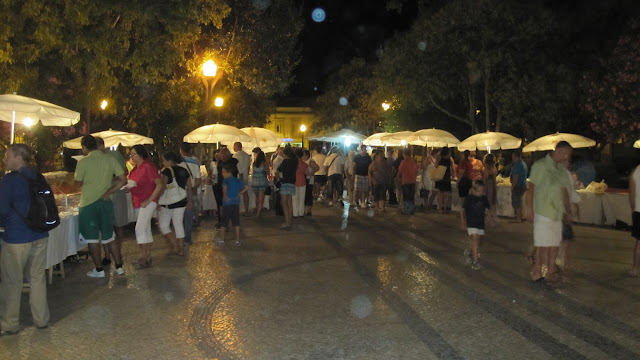The bombeiros fought manfully for 4 days and nights to control the fires. But the gusting winds were forever shifting direction and moving the targets. Eventually they gained control and the fires were extinguished.
Of course as soon as the flames had died down the knives were out and scapegoats sought. First the bombeiros were blamed, then the government, then the local authorities, until finally the local landowners were deemed to be at fault for not maintaining the land correctly. A sad state of affairs in the light of the disaster that had just happened.
A week after the fires we took a drive around a small area close to Santa Catarina to see the effects of the fires for ourselves. It had been stated that a third of all the Tavira province had been destroyed and from what we saw this was certainly the case. The colour was black but the acrid smell in the air even a week later highlighted for me what the many people close to the event must have been through.
Blackened skeltons of trees were left to watch over the demise of their home. the land, parched yellow before now resembled the toast I made as a child. Dry, and crumbling. Crying out to be put out of its misery.
My immediate thoughts turned to my times back in England when I used to travel through the moors of North Yorkshire and the Pennine area of West Yorkshire . Here one could observe areas of charcoal coloured land where the heather had been systematically control burned. This enables the heather to regenerate itself and created an improved environment for the nesting grouse and other species that live in these areas. So could there be a benefit to the land after all this devastation? Only time would tell.
 |
| July 2012 |
 |
| October 2012 |
Last week (mid October) we took another drive through the same area to see if there had been any signs of change to the land. We have not had a great deal of rain so far this autumn so there is obviously a need for more moisture. But to our pleasant surprise the whole area does look greener, there has been regrowth of plants and trees and there is a notable presence of bird life which is very encouraging. .
 |
| Eucalyptus Tree showing signs of regrowth |
There had been a lack of firemen and vehicles, poor air support, some poor ground coordination, a lack of firebreaks, difficulty in following the fire’s path and hence a failure to predict its movements across the land. Multiple outbreaks added to the confusion.
Among the various recommendations, Macedo said that better assessment of the fire’s path, timely public warnings and better training and equipment would improve control systems in the future.
The mayor of Tavira, Jorge Botelho, has called for an increase of funds for fire prevention work.
He said this is also the time to train professionals in civil protection and in preventative work and to provide means to ensure forest clearance is undertaken.
"The idea that part of the civil protection budget could be used to clear scrub land is very interesting and I believe it has every opportunity of becoming the case, after this evaluation process," he added.
The mayor said that many landowners had kept their land clear but others could not afford to do so, despite being legally obliged.If land has not been cleared the local council is empowered to issue an order for the work to be undertaken.
Interesting comments in the light of the present economic situation and the fact that many of these landowners have just lost the ability to supplement their meagre pensions because of the fires.
This past weekend the municipalities of São Brás de Tavira and, in partnership with international consultant Jack Soifer promoted an open conference to debate what can be done to protect the Serra do Caldeirão. The debate was titled in English "Innovating in Burnt Lands - New approaches for Serra do Caldeirão ", a meeting open to residents of saw and the general public interested in recovery and dynamic agricultural land mountain.
Agricultural practices being one of the most interesting measures to prevent fires, this debate was intended to be an incentive for new approaches to the mountainous region , and draw upon a panel of national and international experts.
It will be interesting to see what conclusions and recommendations are arrived at.




















































